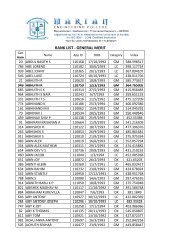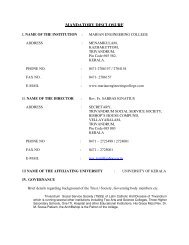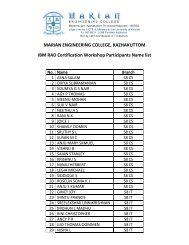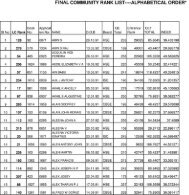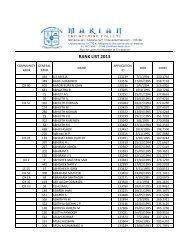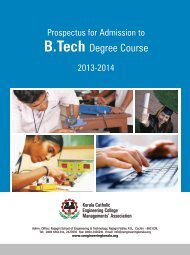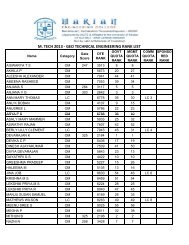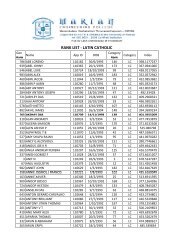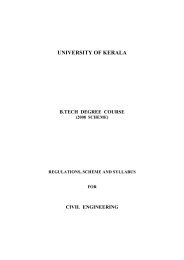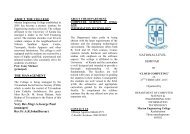UNIVERSITY OF KERALA - Marian Engineering College
UNIVERSITY OF KERALA - Marian Engineering College
UNIVERSITY OF KERALA - Marian Engineering College
You also want an ePaper? Increase the reach of your titles
YUMPU automatically turns print PDFs into web optimized ePapers that Google loves.
B.Tech Comp. Sc. & Engg., University of Kerala 67<br />
08.705 (1) ADVANCED DATABASE MANAGEMENT SYSTEM (ELECTIVE II) 3 – 1 – 0<br />
Module I (17 hours)<br />
Overview of relational database concepts- distributed DBMS – concepts and design- functions and<br />
architecture of DDBMS- distributed relational database design- transparencies in DDBMS- distributed<br />
transaction management- concurrency control deadlock management- distributed database recoveryreplication<br />
servers- query optimization- mobile database<br />
Module II (17 hours)<br />
Object DBMS- weaknesses of RDBMS- object oriented concepts- storing objects in relational database-<br />
OODBMS concepts and design – perspectives- persistence- issues in OODBMS- advantages and<br />
disadvantages- object group- object database standard – object store object-relational database examples<br />
Module III (18 hours)<br />
Web technology and DBMS- web as application platform – data warehousing concepts – data warehouse<br />
architecture- online analytical processing – OLAP benchmarks, applications, benefits and tools – introduction<br />
to data mining<br />
Text Books:<br />
1. Database systems, a practical approach to design implementation and management – Thomas Connolly and Caroly<br />
Begg, Pearson Education<br />
Reference Books:<br />
1. Fundamentals of database systems – Elmasri and Navathe, Addison Wesley<br />
2. Object oriented interfaces and databases – Rajesh Narang, PHI<br />
3. Object oriented database systems: approaches and architectures – C S R Prabhu, PHI<br />
4. Database management systems – R Panneerselvam, PHI<br />
5. Data Warehousing – C S R Prabhu, PHI<br />
Internal Continuous Assessment (Maximum Marks-50)<br />
25 Marks - Tests (minimum 2)<br />
15 Marks - Assignments (minimum 3) such as home work, problem solving, literature survey, seminar,<br />
term-project, software exercises, etc.<br />
10 Marks - Regularity in the class<br />
University Examination Pattern<br />
PART A: Short answer questions 10 x 4 marks=40 marks<br />
All questions are compulsory. There should be at least three questions<br />
from each module and not more than four questions from any module.<br />
PART B: Descriptive/Analytical/Problem solving questions 3 x 20 marks=60 marks<br />
Candidates have to answer one question out of two or two questions<br />
out of four from each module.<br />
Maximum Total Marks: 100



